Founder mode, Bezos Book, Child Maxing, Curing Bipolar & Cavities, New Investments
Hello from New Hampshire. This month I’ve been eating at an awesome Brazilian restaurant almost every day which allows me to focus on working 50-60 hour weeks. Many people hate their work, which is sad. I love my work right now. I started working on a new startup earlier this month, with a few close friends and contractors. It’s clear what needs to be done and who I need to recruit. Starting a new company is often a kamikaze mission impossible. My favorite kind. Optimizing for safety is something I’ll leave to the herd.
I’ve been thinking about launching this venture for the past ten months. At the end of August, I went to an island in Maine where my family owns a few properties. I was out there by myself for four days with no phone, laptop, TV, or even a radio. Just the birds and what not.
On day 4, I paddle-boarded back to my car, and drove back to New Hampshire, listening to the Founder’s Podcast episode about Isaacson’s Elon Musk biography. I realized that I need to do this, and I need to do it now. Nobody else is going to do it. And every day that I don’t work on it is potentially hundreds of lives deleted from the timeline.
“If you want something done right,” my father said, “do it yourself.”
The next day, I named the company, Vital, and David and I began what could be a 100+ year project.
Turns out it’s an all consuming job that I’m uniquely well suited for. I procrastinated on doing it because I thought I’d hate it, and that it would be too hard. Turns out I love it.
A big benefit of funding the company with my own money (at least for now) is that we aren’t getting sidetracked into creating pitch decks to appeal to investors. We are laser focused on designing, creating, and delivering products and services that people love. The workmanship is the reward.
The company objectives are:
Save customers money
Improve health
Increase fertility
In the past three weeks I’ve spoken into dozens of founders, engineers, designers, video editors, and marketers. A few of them I’ve hired, a few of them I’ve already fired.
A girl from Reddit just called me, interrupting my writing. She was very nice. We’re exploring running an ad campaign on Reddit.
I like doing all this stuff. Recruiting, product, design, marketing, evangelizing. It feels like I’m doing what I was made to do.
On Day 25, after drafting a design for our dashboard, the gravity of the ambition hit me. I said to David, “I feel like an untrained mechanic cobbling together a plane, and we’re about to try to fly it. This does not feel safe.”
David, who has bootstrapped and exited a startup, said “Yup. That feeling never really goes away.”
Underrated Book
Jeff Bezos is awesome. He’s more introverted, focused, and thoughtful than other heavy hitters like Musk and Trump.
Since he was in high school, he’s been thinking about moving all polluting industries off of earth, and he’s made substantial progress toward that objective. His rocket company was just selected to take a rover to the moon.
If I’d read this book a year ago, I would have invested three times as much into Amazon when I was buying shares last April during the tariff panic. The next best time to buy is probably now.
As an entrepreneur, to even have a chance of making it to cash flow positive, one must learn from the greats who came before. These passages exemplify Bezos’ clear thinking and timeless principles:
Sometimes (often actually) in business, you do know where you’re going, and when you do, you can be efficient. Put in place a plan and execute. In contrast, wandering in business is not efficient—but it’s also not random. It’s guided—by hunch, gut, intuition, curiosity, and powered by a deep conviction that the prize for customers is big enough that it’s worth being a little messy and tangential to find our way there. Wandering is an essential counterbalance to efficiency. You need to employ both. The outsized discoveries—the “nonlinear” ones—are highly likely to require wandering.
…
The biggest needle movers will be things that customers don’t know to ask for. We must invent on their behalf. We have to tap into our own inner imagination about what’s possible. AWS itself—as a whole—is an example. No one asked for AWS. No one. Turns out the world was in fact ready and hungry for an offering like AWS but didn’t know it. We had a hunch, followed our curiosity, took the necessary financial risks, and began building—reworking, experimenting, and iterating countless times as we proceeded.
…
As I said in the first shareholder letter more than twenty years ago, our focus is on hiring and retaining versatile and talented employees who can think like owners. Achieving that requires investing in our employees, and, as with so many other things at Amazon, we use not just analysis but also intuition and heart to find our way forward.
The Child-Maxing 5%
My family has been decimated—absolutely cooked—by low fertility. Both my maternal and paternal sides failed to procreate enough to keep the family from dwindling to almost dead. The family tree is an upside-down pyramid.
There are eight properties in the family and zero people in the generation below me to inherit them.
I started to ask, how could a person or group raise the fertility of a specific person in order to avoid familial deletion?
I messaged my friend, Simone Collins , who is due to have her fourth child in a few days. She recommended this book to me:
Chapter five begins with this:
The project of this book was motivated by a single intuition: that if a phenomenon is sufficiently consequential, then its absence must also be consequential. Vaccination for smallpox was discovered when it was noticed that some people had an uncanny resistance; the deadly effects of the disease were strangely absent among cattle workers and milkmaids. And though most Americans are having fewer children, the birth dearth is not the whole story. Averages hide a lot of variation in the lives of actual women, some of whom are doing something very different. I undertook this research convinced that the study of high birth rates could shed light on the problem of low ones.
Largely hidden from popular view, there are women around the country having five, six, even seven or more children. The Census Bureau estimates that 5 percent of women aged forty to forty-four have five or more children today. This works out to about half a million women
While the number of women having five or more declined from 20 percent in 1976, it did not continue to fall after 1990; the 5 percent has remained relatively constant since then. “The 5 percent” are strangely immune to the trend toward below-replacement fertility. Why they exist in a two-child world is as much of a puzzle to scholars as is the plunge of the general birth rate to below replacement.
…
From chapter one:
I suppose it boils down to some sort of deeply held thing, possibly from childhood—a platinum conviction—that the capacity to conceive children, to receive them into my arms, to take them home, to dwell with them in love, to sacrifice for them as they grow, and to delight in them as the Lord delights in us, that that thing, call it motherhood, call it childbearing, that that thing is the most worthwhile thing in the world—the most perfect thing I am capable of doing.
Hannah, one of the main characters, says things at the level my ears yearn to hear:
“across generations, individuals have ancestors to whom they have debts and also offspring toward whom they have responsibilities. Childbearing cancels the debts, as it were, while giving rise to new obligations. Paying it forward, we would say now. Having children confers an eternal status on any one individual in the chain, making her equal in dignity to her kin for all time. “Continuing the legacy by having children,” Hannah says, “is a way to be a part of this chain of infinity.”
YouTuber I’m watching
Last winter, I was researching bipolar disorders. I stumbled upon the insane story of Matt Baszuki. His father is the founder of Roblox, and because of that, a multi-billionaire.
Matt, tragically, went insane during college. He stopped sleeping, and quickly departed from reality.
His father tracked him down and found him with a garbage bag in a Starbucks, hundreds of miles away.
Matt was hospitalized four separate times with psychosis. He tried 29 different medications. But the manias kept coming back.
Today, Matt is now an exceptional YouTuber talking about how he and his team were able to cure his severe mental illness with metabolic therapies. He credits therapeutic ketogenic diet as the main thing that saved him.
I think Matt is going to have a big impact on a lot of people (he already has) by helping people put into remission their psychiatric maladies with metabolic therapies. His family started an advocacy group, Metabolic Mind.
Gum I’m Chewing
I can’t chew gum with aspartame in it because that chemical, like many other synthetic additives, causes me migraines — which do not help my sanity.
A few years ago, I found a gum that doesn’t have aspartame. It’s sweetened with xylitol instead—a naturally occurring sugar alcohol.
Cavities are caused by the mouth bacteria, streptococcus mutans, secreting acid on your teeth. Turns out xylitol kills this bacteria, thus preventing cavities.
It’s a miracle, in my book, that xylitol is both natural and sweet-tasting, and prevents cavities.
Why don’t dentists tell people about this? No money in that, I suppose.
From 2017-2022, I developed 15 cavities, despite daily teeth brushing and a relatively low sugar diet. Anyone who has read my book knows about my visits to the dentist haha. Three years ago I started chewing xylitol gum, and using xylitol toothpaste. I’ve not developed a cavity since.
Companies I’m buying (not-investment-advice)
If you’ve been reading this blog for a while, you’ll know that last winter I changed my investment strategy. I sold the majority of my TSLA shares, after holding most of them for 7+ years.
I’ve since bought meaningful amounts of Amazon and Google, and a smaller amount of Berkshire Hathaway. Another company I’m considering buying, although I feel late to the party, is NVIDIA.
My job as an investor is to develop conviction in the future cash flow growth of a company, and invest proportionately. To do this, I listen to the leaders of the company. The leadership has a massive impact on the earnings potential, which determines the future value of the shares.
I like to get to know someone very well before I put them in control of my net worth. I listen to their podcasts and earnings calls, and read their writing. I’ve started to get to know Sundar Pichai and Demis Hassabis at Google, and Big Dawg Bezos and Amazon Andy Jassy. This approach to investing is synergistic with being a founder because much of what they say is applicable to my own ventures.
This is really an incredible time to be alive. I’m grateful for it, and excited to see what happens. My preference is to predict the future by creating it, as much as we can.
Thanks for reading, and have a great rest of your day!
Photos from New Hampshire
Summit of some random mountain in the Northern White Mountains. Ended up being a 10 mile day.
Two things I like (affiliates)
Nervous System Mastery with Johnny Miller. Discount code: CHRISJAMES
CrowdHealth - best alternative to US health insurace. Dicount code: BIGWIN



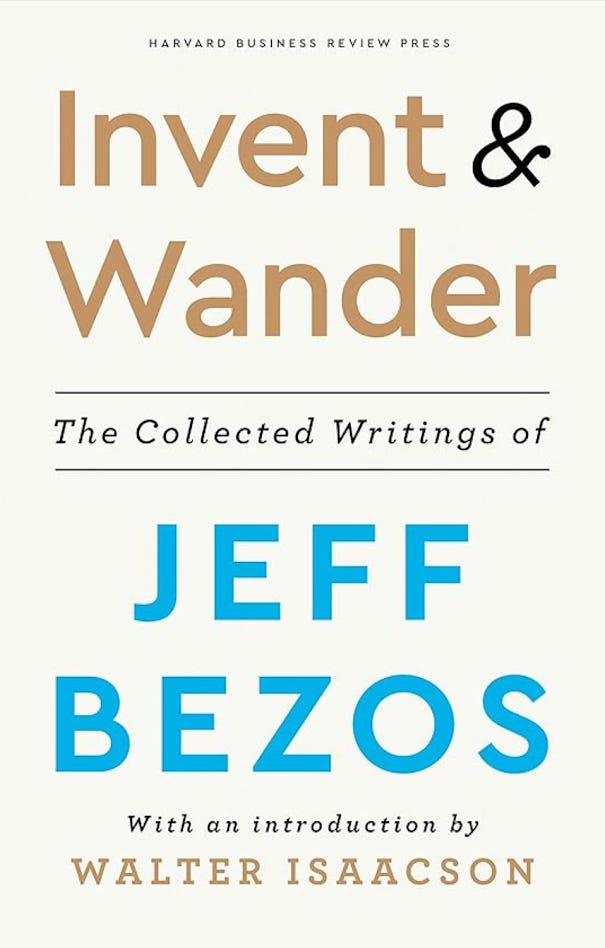

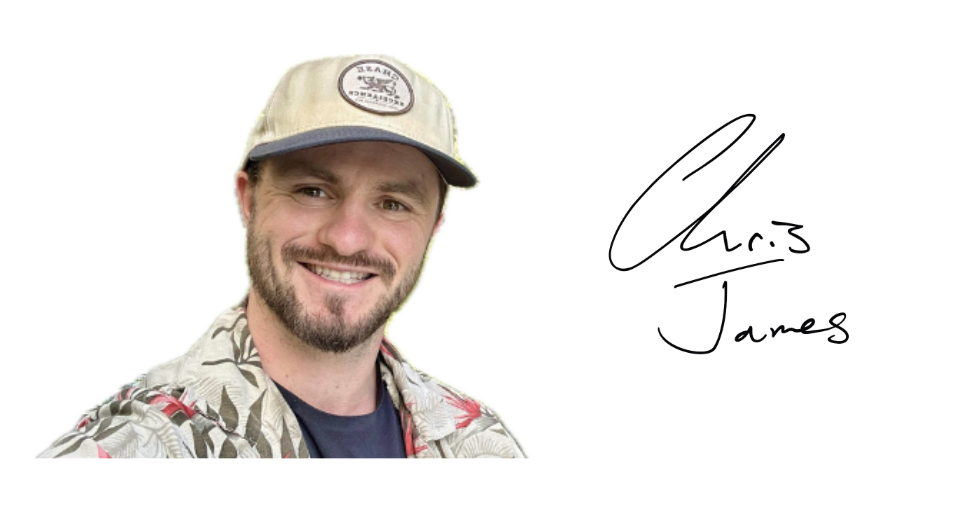
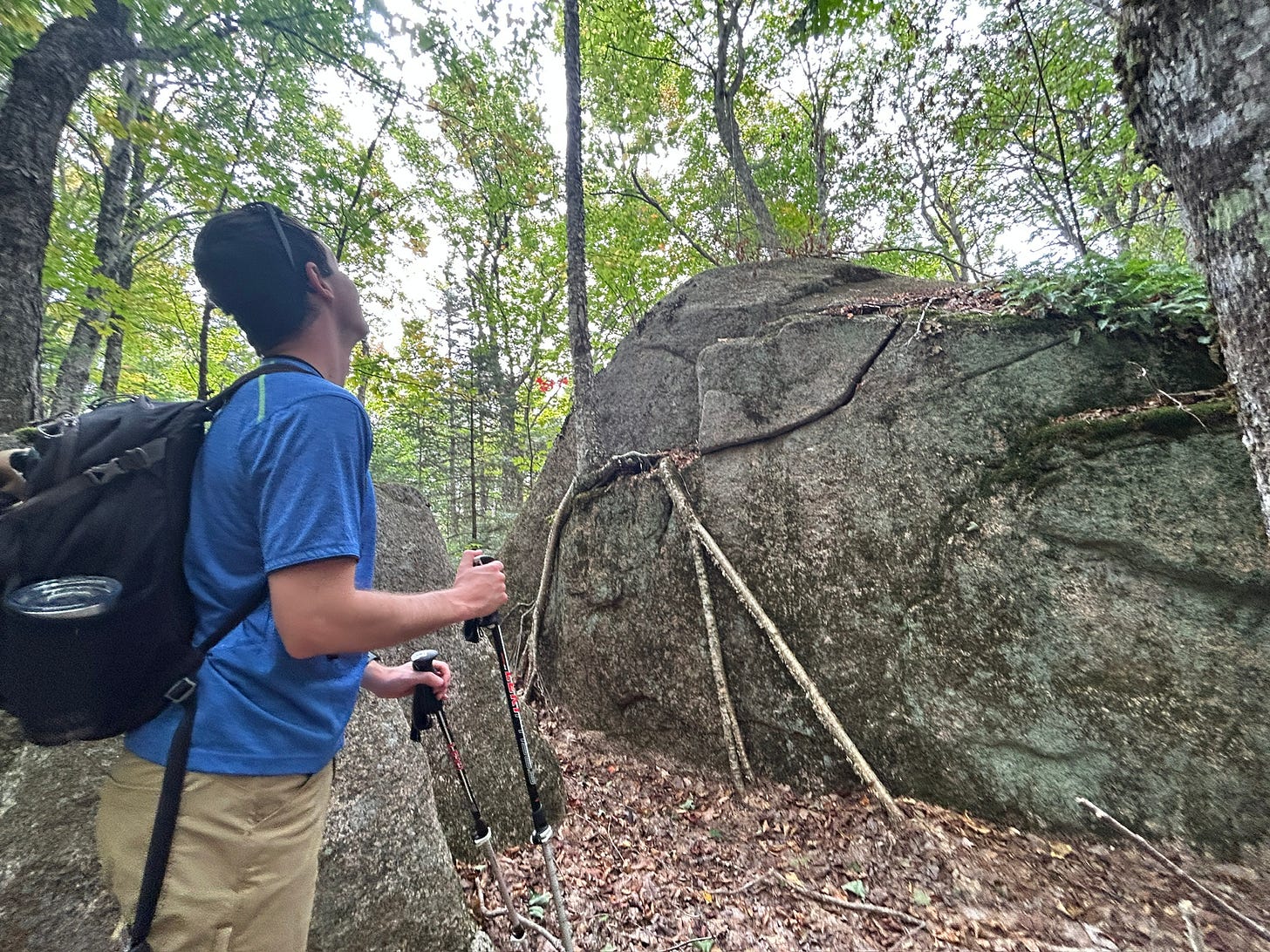
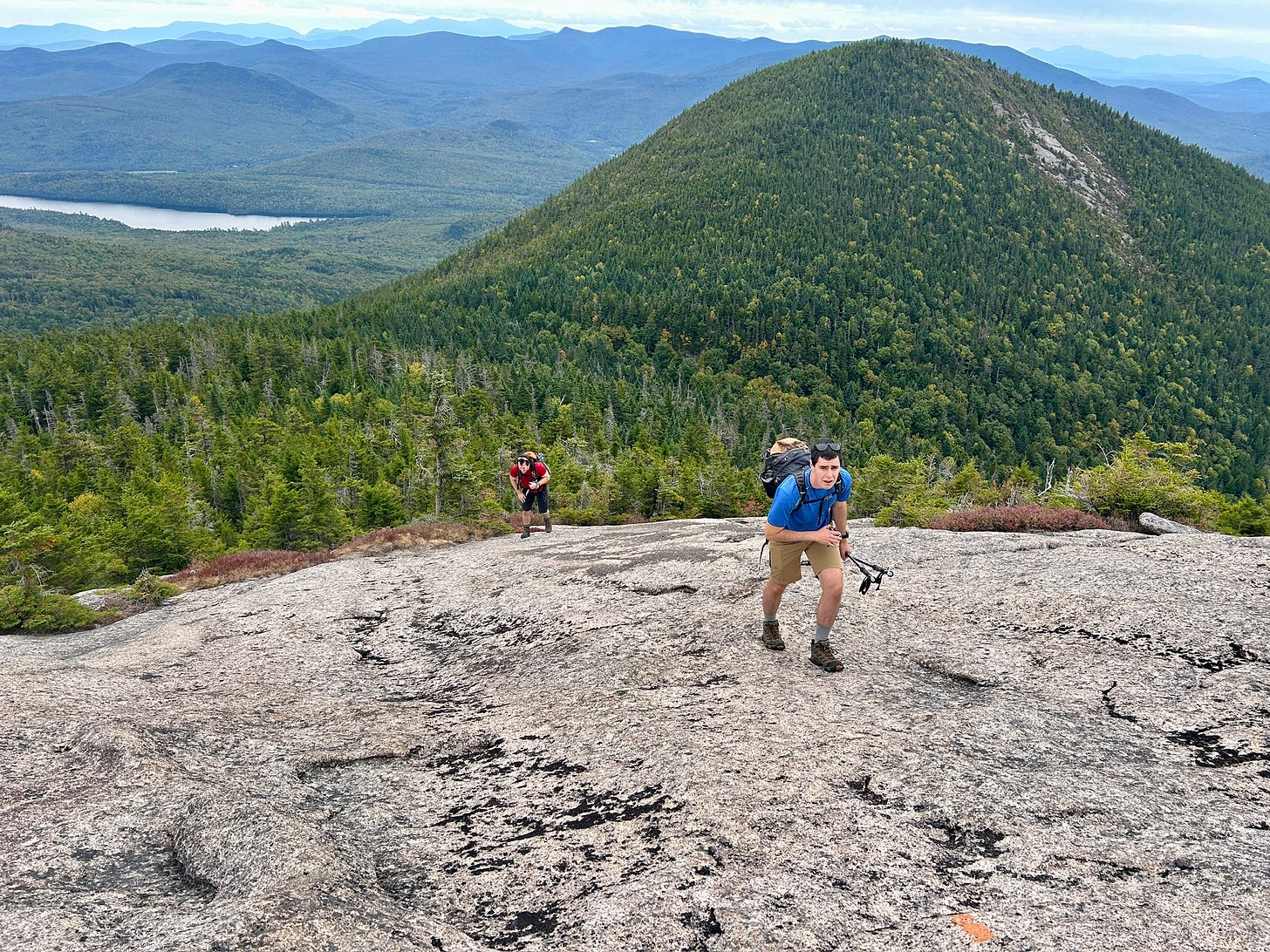
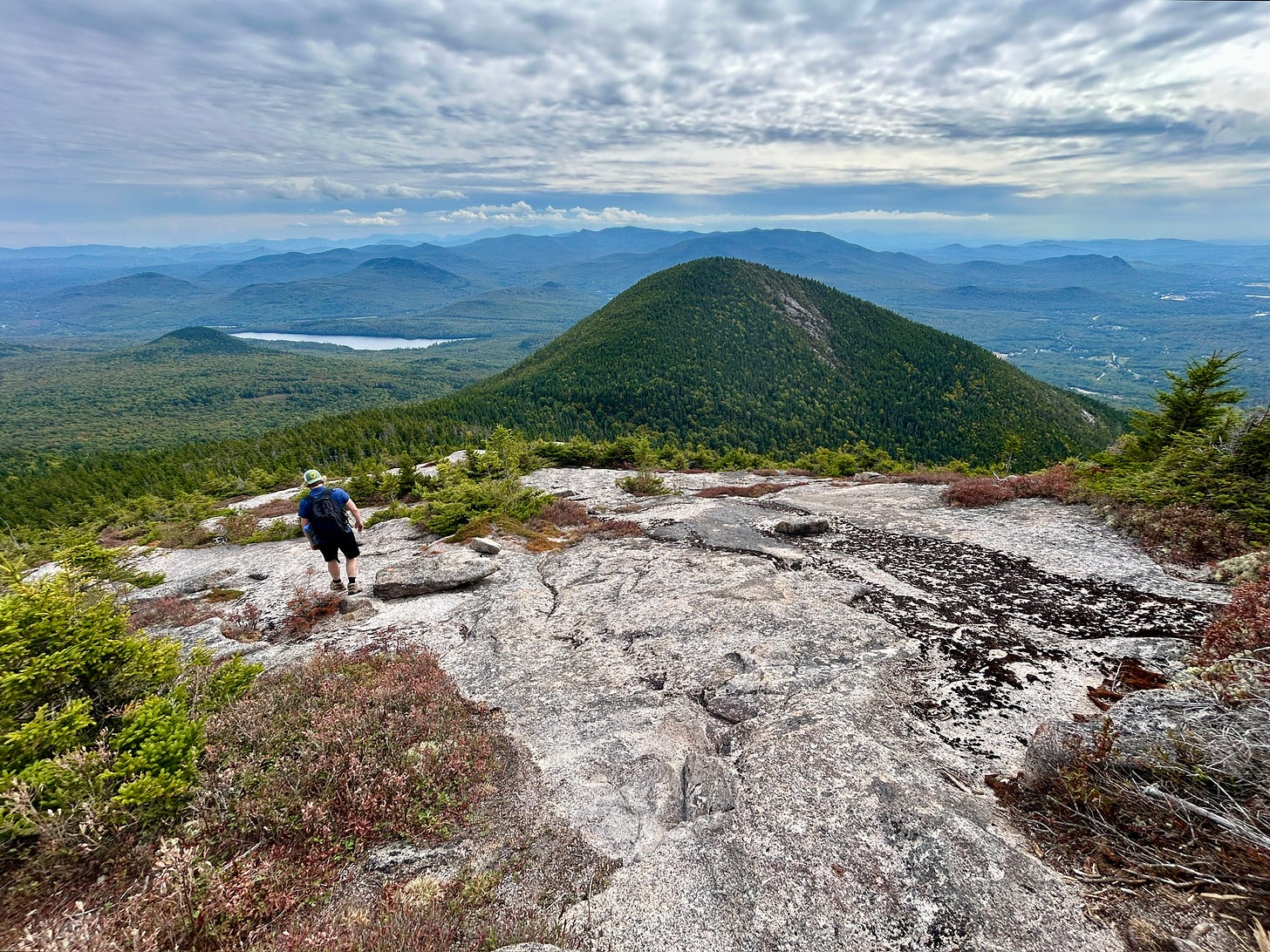
Cool to see that Bezos endorses how wandering can have utility!
Also you made me rofl. My dad is a dentist and obsessed with xylitol gum. He recommends it to his patients to buy! I quit chewing gum about a decade ago, though, because my TMJ already gets enough action during my slumber.